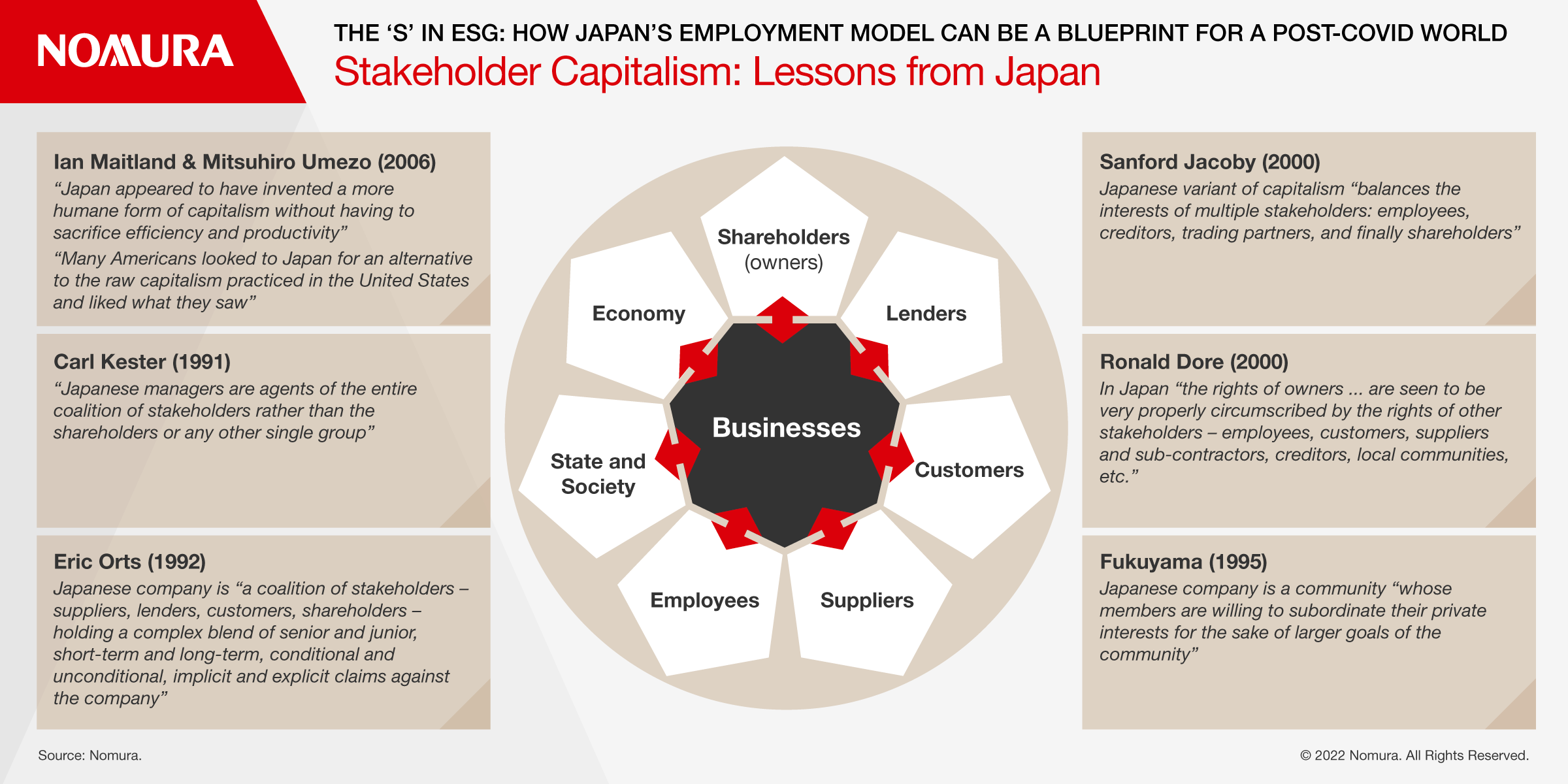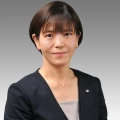Companies have a lot to gain from steering in the direction of valuing employees as an asset especially in a post-Covid world where health and wellbeing have taken centre stage, according to panellists at Nomura’s global ESG event.
Chie Toriumi, Head of Content Company and Sustainability Development at Nomura, Linda Zeilina, CEO of International Sustainable Finance Center and Peter Matanle, Senior Lecturer in Japanese Studies at the University of Sheffield, discussed the merits of Japan’s lifetime employment model in a panel on defining the `S’ In ESG.
Moderator Jim McCafferty, Joint-Head of APAC Equity Research at Nomura set the scene by explaining how Japan’s mode of capitalism, sometimes referred to as Gapponshugi or “community capitalism” runs counter to the US-led shareholder-first model espoused by Milton Friedman and Western policymakers. Studies show that Japanese companies often put the interests of employees, customers and society ahead of shareholders. Investors cited this practice as a reason to avoid Japanese equities in the late 1980s. But Japan’s style of doing business is now back in vogue as global investors have encouraged companies to prioritize employees amid the COVID-19 pandemic.
McCafferty said that Shibusawa Eiichi, known as the father of Japanese capitalism is credited with fostering an approach to business that included a social angle. He will feature on the new 10,000 yen note from 2024. Shibusawa's focus on the moral aspect of doing business shows he was ahead of his time as today’s companies wrestle with incorporating ESG elements.
Matanle explained how he analysed 6 Japanese companies 20 years ago to better understand the employment system as a whole in large organisations but also in the context of industrial sectors. He interviewed 130 executives and found that attention was focused on the long term development of human capital with companies intent on enabling employees to realise themselves within their organisations.
He found that average tenure is over 13 years in Japan compared to 8 and 6 years in the UK and US respectively, and 9-11 years in Central and Western Europe. Employees found long term employment provided great stability in their lives. It allowed executives to concentrate on their work and progress their careers, and overall, employees were satisfied and fulfilled, he said.
“That stability and concentration on developing human capital and allowing employees to develop their abilities is something that organisations in other countries can learn from as it provides the organisation with a strong foundation for growth and economic sustainability,’’ he said.
Toriumi at Nomura echoed that view, explaining how Japan’s Lifetime employment system brings psychological safety among employees and loyalty to the organisation, which makes sense when looking at ESG, which is inherently long term.
She said that while this system might fit better with the current situation amid Covid-19, it has been subject to criticism that corporate profitability is relatively low due to an inflexible labour market.
“Under the current situation, we have more advantages with Japan’s long standing historical system,” said Toriumi.
She explained that while Japanese firms have been paying greater attention to shareholders over recent years, Western firms have moved even further in that direction and are now going back to a multi-stakeholder capitalism model. A hybrid model combining psychological safety, loyalty, and flexibility of employment - leading to improved productivity - was the right approach for the modern workplace, Toriumi said.
Zeilina at ISFC conducted research in this area exploring how investors are integrating Social characteristics. She carried out 160 conversations across the globe spanning industries and sectors and found that Covid had brought urgency to the importance of social issues. She highlighted that companies had incurred tangible financial losses stemming from their approach to employee health and by missing red flags under the umbrella of social risks such as hidden slavery among suppliers.
Boohoo.com, for example, lost $2 billion in market value in 2020 after poor labour practices were exposed in its supply chain. The number of non-disclosure agreements at an organisation could be another red flag.
“Investors struggle with S as it’s complex and often seen as political issue,” she said. “But there’s a growing understanding that human capital is a great asset.’’
Zeilina emphasised how the younger generation places great value on how workplaces treat both the environment and society.
Gender Equality
The panel also touched on gender equality. Toriumi said that when she joined Nomura more than 30 years ago there were only 7 females in an intake of 300 but that things had improved with 6 women now holding the position of senior managing director. She highlighted that Japan’s lifetime employment system may have contributed to an historically low rate of female senior managers as those who left their firms had to start again to rise up the career ladder.
While Nomura management has fewer than 20% women, Nomura has joined the 30% Club Japan with a goal to increase this number as gender balance in decision making bodies enhances corporate governance and promotes sustainable growth.
Matanle explained that the so-called M curve showed that employment of women in Japanese organizations is high when women are in their 20s but by their early 30s many resign to raise their children and rejoin when they are more independent.
Now we see rising labor force participation for women in their 30s, 50s and 60s, according to Matanle but there is still a deterioration in employment conditions compared to men who generally see higher salaries and greater career progression.
Zeilina said that efforts are underway to better understand where companies stand on the issue as highlighted by the world’s biggest pension fund, Japan’s GPIF, gathering data on gender equality at companies.
Matanle said that ESG is a powerful mechanism for embedding more fruitful and fulfilling practices within organisations in all countries driven by the UN sustainable development goals and senior decision makers focusing on these issues.
“Things are changing in the West and US too,” he said. “We saw a recent book called Greed is Dead by two leading economists and the idea that ‘greed is good’ from the infamous film in the 1980s, is gone now in the West”





